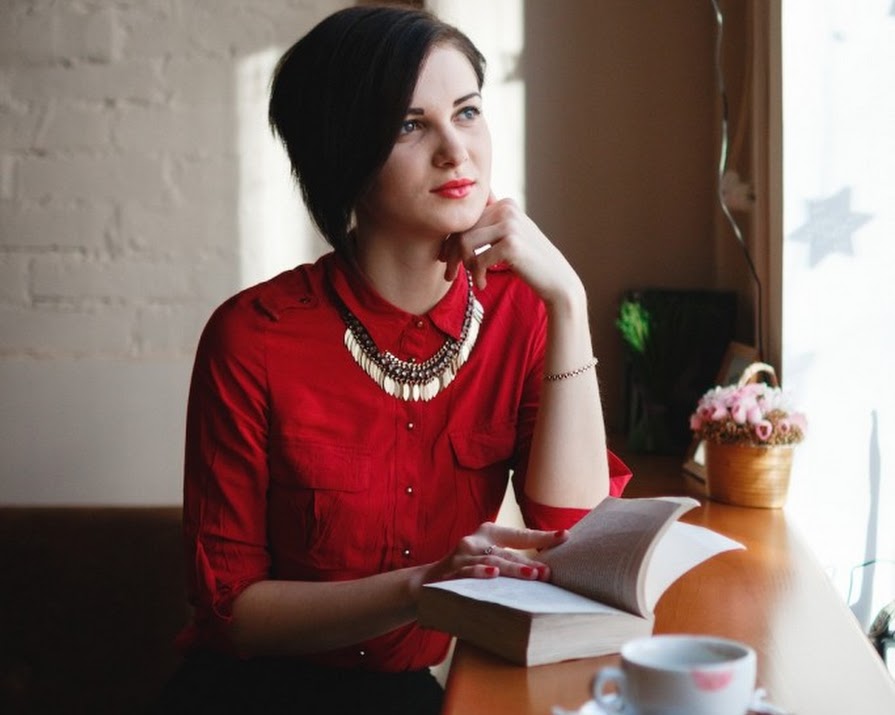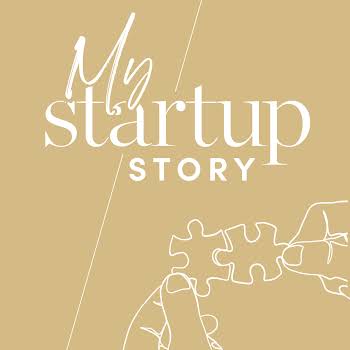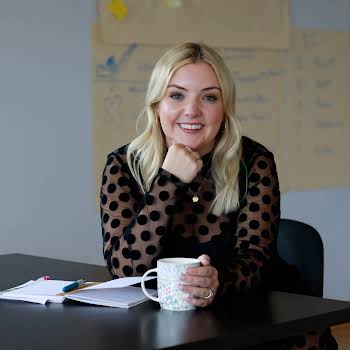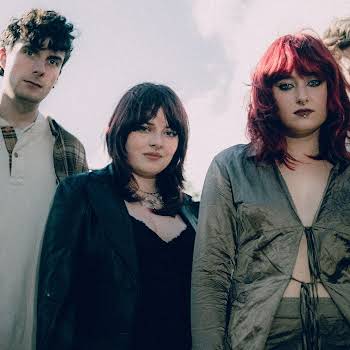
By Jeanne Sutton
27th Aug 2015
27th Aug 2015
Ask any girl who got her teenage hands?on Jane Eyre or Sylvia Path her ideal job and she’ll rhapsodise about something in publishing. This desire for a career in books and writing is one which has prompted countless arts degrees, dreaded years of interning and, if you’re lucky, a job and no more emails to your parents about bills and promises that this will be the last time.
However, all that realness aside, putting words together or?helping people discover new writers is a high that doesn’t abate for many, especially these six women who are pursuing careers in the publishing industry. From freelance journalists and bloggers, to established correspondents and award-winning book publishers, we get the lowdown from Irish women who are making things happens in the most competitive bloodless landscape there is. We’re talking digital and print, motivation and fatigue, sexism and support with Roisin Agnew, Sin?ad Burke, Sarah Waldron, Sin?ad Gleeson, Lisa Coen and Sarah Davis-Goff.

Roisin Agnew is a freelance writer who has spent time writing for us here at IMAGE.ie, as well as The Irish Times. She’s also editor of Guts, a magazine that seeks out confessional writing alongside compelling graphics. Guts is an ode to beautiful print and is available to buy online and in actual real life shops throughout the capital. It has even been spotted in cities like Amsterdam and London. Between young writers talking honestly about taking drugs and confronting the reality of their failed relationships, it’s a pick-and-mix bag of unflinching writing and uncomfortable millennial truths, all wrapped up in fancy keepsake artwork.
Is setting up a zine in today’s landscape a modern form of madness?
Yes. The thing about it is that there is obviously so much work involved for very little money. The idea of issues means that you’re constantly working, distribution can be quite tricky, generally if the magazine’s topic is specific it needs to be promoted very carefully, and you end up having no downtime no matter what. You’re going to have to keep working a regular job and keep your other gigs going because there’s not enough money in it for you to quit your other responsibilities. What’s more it doesn’t promote you directly also. Often you’re creating a space to celebrate someone else’s writing talent. You learn quickly that there’s no give and take – it’s all give. But the reward is having people email you or contact you via social media to tell you they love what you’ve created.
I read a really good article in the New Yorker recently about the ?persistence of literary magazines? – my magazine Guts is a literary magazine. It mentioned how one of the main reasons people keep starting their own literary magazines is ?to do something that hasn’t been done well before?. When the germ of an idea for Guts took root in my head, I was encouraged by the fact that the concept was original and that it hadn’t been done before as well as I was going to do it. That was pretty much the only thing I was confident about! But that’s also why people keep creating indie magazines and publications – because they know they can execute a strong idea well.

As a young woman in an era which tends not to forget, what with Google etc, do you think personal writing can harm a career?
Absolutely. There are things I would like to write about that I don’t write about because, for one, we live in a small and occasionally judgemental society here in Ireland where things can come back to haunt you. I work as a freelance journalist and have worked in The Irish Times and I certainly think what you write about can affect your employability.
I was recently reading Joan Didion again and it struck me how masterfully she inserts pieces of personal information and confessions into pieces that are factual pieces of hard news journalism. I think we’ve become masters of telling our own stories in our generation, and I think we can apply this to add nuance, colour, and flesh to stories that aren’t necessarily about ourselves, but about the rest of the world. I think that’s a consideration to be made when you think about writing about personal experiences that might harm your career – is it adding to the debate?
What’s the best part of being an editor?
Control. Ha! It’s so satisfying to have the possibility to decide on the subject matter, themes, and the aesthetics of a magazine, approach people you admire to work on it and even get to have a’say on colours and fonts. It’s nice to have a space to let your imagination lose the run of itself for a second. As a freelance writer and journalist, your wilder ideas and least feasible concepts most often get nipped in the bud. With Guts I’ve managed to cover topics, publish pieces, and give vent to my ideas in a way that would never have happened otherwise.

Do you have favourite confessional essays you think every woman should read?
I think the essays in Nora Ephron’s Crazy Salad are important ones for young women to read, particularly as feminism seems to be enjoying a moment among teenage girls. I think it’s a nice way into the subject of feminism and politics. I remember being taught the WB Yeats quote by my mother when I was 17 – ?It’s certain that fine women eat a crazy salad with their meat?. It stuck with me and I used it often thinking how clever I was, until I discovered Nora Ephron in college.
I love Rebecca Solnit’s writing too, as it superimposes personal narrative onto complex topics like environment and urban culture, enhancing them with confessional detail and insight. I like Sheila Heti’s style of writing fiction, which seems to drift between essay writing, memoir and documentation. But my favourite essay is by Zadie Smith. It’s called Joy. It’s a meditation on happiness, drugs, love and it’s everything.
Guts?Issue 4 Kintsugi – Beauty in Brokenness is out now.
Tramp Press is the Irish literary publishers the entire industry is talking about. Still in the start-up stages, this house, founded by former Lilliput interns Lisa Coen and Sarah Davis-Goff, already counts Sara Baume’s dizzying?Spill Simmer Falter Wither among their award-winning output and have released short story anthologies edited by Thomas Morris and Belinda McKeon. They’re very good at what they do. Which why they were one of the nominees at our IMAGE Businesswoman of the Year Awards last year. We chatted to them last Autumn about starting out, but decided to catch up with them again, because they are fountains of book industry knowledge.
Sarah, you recently published an op-ed in the Irish Times about how would-be authors tend to overwhelmingly list male authors as their influences. Regarding the rare progressive few who named women writers, who were they reading?
Sarah: The list is small, but at least varied, with Tana French, Maria Messini and Sarah J Maas all making appearances. A few writers have mentioned Sara Baume, and one talked about Louise O’Neill’s work, which we liked!
Considering Rupert Murdoch owns everything, what are the challenges facing an indie press?
Lisa: We are fighting for (shrinking) space to be reviewed in papers and journals with the massive heavy-hitters. Arts journalists and correspondents are supportive and interested, but more than one has told us they’d love to do a piece on a book of ours, but the space was going to go to the latest blockbuster thriller. We have to be creative and resourceful in reaching’readers,?because the conventional ways are declining.
Do you have any advice for women looking to get into publishing? What about writers?
Lisa: You’ll have to resign yourself to doing a lot of internships to break in. It’s a small industry that rewards perseverance, so most of us have second and third jobs to try make it work. It’s not a healthy’set-up,?and obviously limits access for a lot of talented people. For our part, we didn’t have any prospective jobs; in 2012 I was sending out CVs and letters and making enquiries, going on LinkedIn, etc, and being roundly ignored. And I had a few years’ experience in the industry already. So we started our own company.
For writers, talk to as many people as you can. Anne Enright says ‘there’s no VIP room in Irish literature’ and that’s true; Irish authors are accessible, and the publishers should be too. Our colleagues in the industry are friendly and genuinely looking for great new writing. (Penguin Ireland, for instance, is a large outfit, but they have an open submissions policy). You have to be’really, really sure the work is ready to’send?though. The biggest mistake people make is to send out something half-baked, get rejected and become discouraged, then give up. Take rejections on the chin and keep working away on it.
A Kind of Compass by Belinda McKeon will be published by Tramp Press on 17 September. Preorders are available from?tramppress.com.?Spill Simmer Falter Wither?has been nominated for the Guardian First Book Award and the Warwick Prize. Available from?tramppress.com/shop and in bookshops
Sarah Waldron’s name is familiar to regular Irish Times readers, and discerning internet lurkers. For years Sarah was the distinctive voice behind the blog The Licentiate, but is now concentrating on freelance writing and her new women’s writing collective, The Coven, an online space for witchy women to write on a particular theme each’month. Participants so far have included novelist Louise O’Neill, Xpos? magazine’s beauty editor Aisling Keenan, our fashion writer Jo Linehan, (and me).
What initially drew you to writing??
The finished product, really. I always loved reading – books, magazines, anything – and like most hacks I really like absorbing information, which makes me great at pub quizzes but pretty insufferable after a few drinks. I was quite introverted as a kid and reading gave me the opportunity to disappear inside my own head. It seemed natural to want to be a writer, so I just started doing it. I’ve never done or wanted to do anything other than read and write for a living.
You did a masters in Fashion Journalism in Central Saint Martins. Was it helpful?
Well, it definitely made me a better journalist. The journalism course was, until this year, part of a prestigious MA in Fashion, so I made a pretty amazing contacts. I met the Coven deputy editor Jainnie Cho in class. Doing the course taught me not to be intimidated by the talent of others, and the value of taking time to tease a creative vision out.
The Coven is a website you founded this year and features women’s writing based around a theme every month – is it a stressful project to manage??
There is a period of about three days where I have to take in commissions, send them to Jainnie to be proofed, send out the next month’s commissions, write a newsletter and then write the monthly editor’s letter. That can be stressful. The other 27-odd days of the month, it’s all gravy. We commission and edit all the essays in one big block to get as much done in advance as possible. It helps that I work from home, so I can fit things around my normal freelance writing and consulting work.
You’ve written for daily websites, feminist blogs, national newspapers, and various fashion magazines, as well as freelancing. One, are you not exhausted? And two, what do you make of media at the moment?
One – No, I’m not exhausted, but I do sometimes feel like my brain will dribble out of my ears one day. I think it comes with the territory. There are gaps, as with all freelance work, and sometimes I feel the opposite of tired. I want to do more work. I really like writing for newspapers, magazines and online even though the work requires different writing styles. There’s a formula to everything. It’s like maths or physics, in a way – there’s all these rules and formulas. But in writing, the rules are made to be bent a little.
Two – The media is in a state of flux, and it’s not going to stabilise anytime soon. Obviously this is because of the internet, which has made accessing information immediate, and that in turn puts a massive strain on news and online journalists. But that immediacy of communication has also made collaboration much easier. And that’s where the Coven comes in. I’m in London, but most of our writers aren’t. The current media landscape enables us all to work together.
The money is crap, but I don’t think anyone gets into writing anymore for that. STEM is where it’s at.
Which witch is your favourite??
Sabrina Spellman. No contest.
We have a major won’t-deny-it crush on the terrific person that is Sin?ad Burke. As a blogger Sin?ad writes about fashion in a depth that most Irish fashion internet denizens fail to reach. She’s a walking dictionary on fashion month shows and could probably recall every Alexander McQueen dress that has every existed. Does Trivial Pursuit have a high fashion version? Because Sin?ad would kill it. As a human she’s unfailingly kind and supportive of other women, a characteristic which has led to the pioneering Extraordinary Women series on her website. Extraordinary Women is a wealth of interviews Sin?ad has conducted with women who interest her and inspire her. The common theme? Overwhelming amazingness, from the subjects and in the questions.
Why do you write?
Writing is cathartic. I began Minnie M?lange because I needed an outlet for the information that I had collated in my head. The blog was an online record for me to question and denote my interest in fashion. I never expected anyone to read it much less, find it interesting. However, as the blog has grown, so too has my confidence and today I use it as a platform to challenge my preconceived knowledge and notions of anything and everything and to offer a caring space for women to talk about their failures, ambitions, goals and experiences without inquiring about their work-life balance or their biological clock.
Do you ever get sick of blogging?
I am in a very?fortunate position that blogging is not my profession. I write when I have an emotional response to something. When I click ‘Publish’ on WordPress, I want the proceeding emotion to be pride and a sort of fulfillment, not just a tokenistic gesture because I need to have a specific number of clicks or views this week or month. For that reason alone, I am never filled with dread at the thoughts of writing but the wider reputation of blogging and specifically bloggers can be frustrating. A perception exists that the sole reason for someone to write and record their thoughts online is to gain fame or free items and whilst that may be true for a small number of people, it discredits and damages the thought-provoking and really articulate work that many people do online – either as a past time or as a profession.
How has media and publishing changed between your first blog post and your most recent interview?
It’s a lot noisier and you have had to upskill extremely quickly. From Search Engine Optimisation and tools to examine your social media engagement, the realm of blogging has expanded far beyond beautifully imagery and banner advertising. It’s increasingly difficult for your voice to be heard but if you are confident and tenacious in your unique pursuit, you will eventually attract an audience.
It took me a really long time to begin a?converstation?about the ‘Minnie Meets…’ and ‘Extraordinary Women’ interview series. For a significant period, I genuinely felt that I was typing into an empty vacuum but for me, success is not defined by the number of people reading what I write – it’s about the interesting conversation that I have with my interviewee. If I come away from speaking with someone more enthusiastic and less nervous than I was before the interview – that’s success and I don’t think even a seismic change in how the internet works could diminish that.
What do you want to do next with Extraordinary Women?
My initial thinking for the ‘Extraordinary Women’ series would be that it would last eight weeks. Over a year later, I’m still ridiculously excited about meeting new enthusiastic, confident, creative, hilarious and challenging women from a spectrum of different interests and backgrounds. I want it to continue and at the moment, I’m internally questioning whether or not the format should change. Would it make an interesting podcast? Should I continue to transcribe the conversations? Should I do both? I have yet to answer any of those?questions?but there’s a long-term plan too – I would love to convert the series into a book and I’d also like to host a live #ExtraordinaryWomen event. And write a?PhD…
Most women attempting a career at this old thing we call?journalism probably want to be Sin?ad Gleeson when they grow up. The arts writer fronts radio shows (The Book Show on RTE Radio 1), ran a website that fostered Irish women’s writing (The Anti Room), presents the occasional podcast, has interviewed some of the greats (Including Donna Tartt and J.P. Donleavy at public events), edits anthologies and has a byline in the Irish Times. And she has another book on the horizon. The Long Gaze Back is a compilation of Irish women’s writing from New Island and features thirty short stories from masters of the form such as Maeve Brennan, Mary Lavin and Mary Costello, as well as upcoming talents like Eimear Ryan.
When you set out with the brief for The Long Gaze Back – short stories by Irish women writers – where did you start? Did you have a hit list of names? Did anyone surprise you?
We’re in the middle of an incredible phase of Irish writing at the moment, so I was spoiled for choice. I approached people whose work I admired, with one proviso: the stories had to be new and unpublished. Some writers couldn’t undertake this because of other writing commitments (Edna O’Brien was finishing a novel, and that’s fine by me), but nearly everyone I approached said yes. Since commissioning stories for the book in 2013, more new talent has emerged – Sara Baume, Danielle McLaughlin, Claire Louise-Bennett, Louise O?Neill, Paula McGrath – and I already feel there’s room for another volume!
From the beginning, it was important to me to include dead writers; brilliant women I discovered in college, like Elizabeth Bowen and Mary Lavin, but also women like Norah Hoult and Charlotte Riddell whose work is hard to find and have been somewhat forgotten. The book’s title, The Long Gaze Back, is a quote from Maeve Brennan, one my favourite Irish writers who has a story in the anthology. It suggests looking back over the centuries of women writers who paved the way for others, so there are eight deceased writers, going back to the 18th century, and 22 living contributors.
Do you miss The Anti Room?
Yes! Sometimes I get pang about it, as does Anna, but then we remember all the time and effort that went with it and it passes. I miss the brilliant community of women who wrote for us (including Lisa McInerney, June Caldwell and Nuala N? Chonch?ir who have stories in The Long Gaze Back) and the breadth of subjects people broached. Anna and I always said that we wanted to make a website that we’d want to read ourselves, and the fantastic writers made it just that.
Irish feminist Twitter – an echo chamber or France before the revolution?
All of Twitter, feminist or otherwise, can be a bit of an echo chamber, so it’s worth being diverse in terms of who we follow. Many of the people whose tweets I find interesting are smart, funny folk who happen to be feminists. Currently, I love what The Coven is doing in terms of smart, eye-opening writing with a Feminist angle.
From where you’re typing, how has journalism changed in the past decade?
It has changed massively, given the shift to online content. Payments for freelancers are much lower, and unless you’re staff or salaried, no one can rely solely on a print career. Social Media has really impacted on the speed at which stories are delivered and disseminated. Despite our alleged short attention spans, it’s heartening to see readers are still committed to long form work and great essays.
You’ve conducted so many interviews for print and radio and in public – what have you learned about the art of interviewing in the past few years?
Rule number one: it’s not about you! With public events, the audience is there to see the interviewee. I try to cover a lot of ground but keep my questions short – the less I talk, the more people hear from their beloved writer/musician/activist. Also, it’s a conversation, not an interrogation so it’s vital to listen and not just nod along waiting to ask your next question. Go off script if things veer that way. You’ve got to cover certain ground with people, but it’s important to engage them by asking interesting questions. The best response you can get from an interviewee (unless they’re making it up of course) is ?I’ve never been asked that before?.
The Long Gaze Back: an Anthology of Irish Women Writers edited by Sin?ad Gleeson will be published on September 10th by New Island books and is available for pre-order here.?Sin?ad will be speaking at the?Lughnasa International Friel Festival in Belfast this weekend, talking about Women in Publishing and The Long Gaze Back.



























